Catégories
|
Catégories principales > 08 - ALIMENTATION > 8.1 - Consommation Alimentaire. Comportement
8.1 - Consommation Alimentaire. Comportement |
Documents disponibles dans cette catégorie (934)
 Ajouter le résultat dans votre panier Affiner la recherche
Ajouter le résultat dans votre panier Affiner la recherche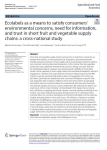
Article
Short food supply chains (SFSCs) are increasingly regarded as promising alternatives to industrialized food distribution systems. They aim to create geographical, logistical, and social proximity between food producers and consumers. Despite ext[...]
Article
This study aims to assess Tunisian consumers’ adherence to the Mediterranean diet (MD) and identify socioeconomic factors influencing this adherence. A national survey involving 400 individuals is performed and data are analyzed. The results of [...]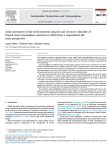
Article
Five prospective scenarios combining changes in diets, supply chains, and agricultural practices have been proposed for French food consumption in 2050, including a business-as-usual (BAU) situation. This study aims to perform a joint assessment[...]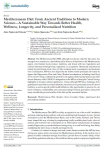
Article
The Mediterranean Diet (MD), although not always called by this name, has emerged over centuries as a diet influenced by diverse civilizations in the Mediterranean region, who blended local produce, traditions, and rituals with new ingredients a[...]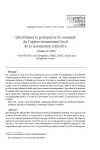
Article
En s'appuyant sur une revue de la littérature et sur ses activités d'enseignement et de recherche, l'auteur engage un débat sur le « pourquoi » et le « comment » de l'approvisionnent local de la restauration collective. Il défend tout d'abord qu[...]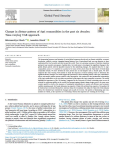
Article
The burgeoning frequency and intensity of varied global exogenous shocks such as climate variability, economic slowdowns, conflicts, scarcity, changing demand pattern, loss of Agricultural land, new age diseases etc have undermined the food secu[...]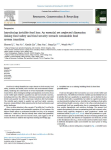
Article
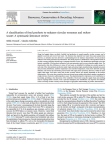
Article
Along food supply chains, one-third of global food production is wasted annually: circular economy can be applied to prevent and recover food waste. The literature has explored food waste from many perspectives; however, no attention has been de[...]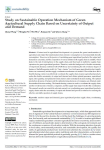
Article
A future trend in agricultural development is to promote the green transformation of agriculture and realize the transformation from extensive consumption to environmentally friendly consumption. However, in the process of circulating green agri[...]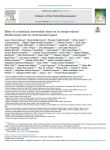
Article
L. Álvarez-Álvarez ; M. Rubín-García ; F. Vitelli-Storelli ; S. García ; C. Bouzas ; M.Á. Martínez-González ; D. Corella ; J. Salas-Salvadó ; M. Malcampo ; J.A. Martínez ; Á.M. Alonso-Gómez ; J. Wärnberg ; J. Vioque ; D. Romaguera ; J. Lopez-Miranda ; R. Estruch ; F.J. Tinahones ; J. Lapetra ; L. Serra-Majem ; A. Bueno-Cavanillas ; C. García Fernández ; X. Pintó ; M. Delgado-Rodríguez ; P. Matía-Martín ; J. Vidal ; C. Vázquez ; L. Daimiel ; E. Ros ; A. García-Arellano ; M.Á. Martínez ; J.V. Sorlí ; M.D. Zomeño ; A. García-Rios ; S. González-Palacios ; M. Monserrat-Mesquida ; I. Abete ; A. Colom Fernández ; R. Casas ; N. Cano Ibáñez ; L. Ugarriza ; M.R. Bernal-López ; M. Bes-Rastrollo ; I. Paz-Graniel ; E.M. Asensio ; M. Fitó ; A.P. Arenas Larriva ; A. Oncina-Cánovas ; Z. Vázquez ; M. Fernández de la Puente ; A. Pérez-Vega ; J.A. Tur ; V. Martín-Sánchez |Objective To estimate the environmental impact of a dietary intervention based on an energy-reduced Mediterranean diet (MedDiet) after one year of follow-up. Methods Baseline and 1-year follow-up data were used for 5800 participants aged 55-75 y[...]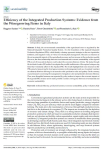
Article
The global food system has three recognized challenges: (a) increasing the availability of food for consumption; (b) reducing food loss; and (c) reducing food waste. The increasing demand for food for consumption, the increasing quantity of food[...]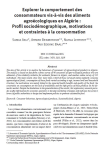
Article
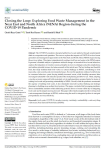
Article
The COVID-19 pandemic disrupted global food waste patterns through unanticipated shifts in composition and quantities. This review explores the impacts of COVID-19 on food waste generation and management approaches in the Near East and North Afr[...]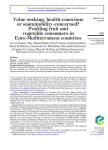
Article
L. Camanzi ; S. Ahmadi Kaliji ; P. Prosperi ; L. Collewet ; R. El Khechen ; A. Michailidis ; C. Charatsari ; E.D. Lioutas ; M. De Rosa ; M. Francescone |Purpose: The aim of this study was to investigate consumer preferences and profile their food-related lifestyles, as well as to identify consumer groups with similar attitudes/behaviours in the Euro-Mediterranean fruit and vegetable market. Des[...]
Article
À l’aide d’une expérimentation en salle, menée auprès de 161 consommateurs, cette recherche apprécie l’influence de trois formats d’affichage (échelle multicritères, note et logo « produit durable ») de deux types d’informations (environnemental[...]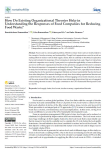
Article
R. Ramanathan ; U. Ramanathan ; K. Pelc ; I. Hermens |Food waste is a serious global problem. Efforts to reduce food waste are closely linked to the concepts of circular economy and sustainability. Though food organizations across the world are making efforts to reduce waste in their supply chains,[...]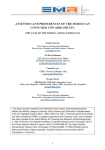
Article
L. Ouahi ; M. Ait Hou ; L. Camanzi ; P. Prosperi ; R. Amin |In this paper, we review and discuss the factors that affect consumer preferences and attitudes towards fruit. The objective is to provide a theoretical framework for an empirical study to identify the factors influencing the Moroccan consumer's[...]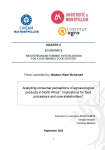
Thèse, Mémoire, Master
N. Wael Mohamed | 2024The demand for more nutritious and sustainable food is projected to increase 50% by 2050, especially after the corona pandemic. Therefore, increasing productivity must align with sustainable environmental goals by replacing conventional practice[...]
Thèse, Mémoire, Master
M. Makhloufi | 2024This review gathers literature about the dietary behaviours of adult migrants living in Europe and France. It focuses on the factors influencing the migrants’ food choices. The aim of the study is to map out the research found in Europe about ho[...]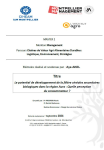
Thèse, Mémoire, Master
Face aux défis climatiques, l'intérêt pour des pratiques alimentaires durables, notamment la consommation de céréales résilientes comme le sorgho, le millet, le sarrasin, le seigle et le grand épeautre, est en hausse. Ces céréales, adaptées aux [...]
Article
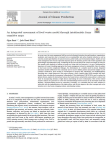
Article
In recent years, the waste management field has received substantial attention from policymakers, organizations, academics, and researchers due to increased focus on sustainability and carbon footprint reduction as well as concerns around rapid [...]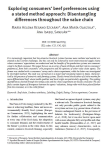
Article
It is increasingly important that the extensive livestock systems become more resilient and market orientated to face current challenges. But this can only be achieved by more interconnected supply chains where consumers’ expectations are unders[...]
Article
K. Deconinck ; M. Jansen ; C. Barisone |Powerful long-term drivers are increasing both the demand and supply of quantified environmental impact information in food systems. The trend is fast (with many initiatives underway) and furious (presenting a confusing landscape) but has so far[...]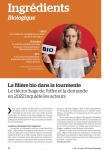
Article
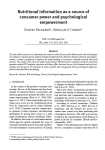
Article
The aim of this research is to determine the extent to which the use of the Internet and web technologies can enhance consumer power and psychological empowerment. Based on theories of power and empowerment, a model is proposed to improve the u[...]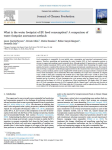
Article
Food consumption is responsible for most global water consumption and associated environmental consequences. Therefore, quantifying and monitoring the water footprint (WF) of food consumption patterns is relevant to support policymaking toward s[...]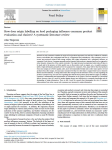
Article
Research on why consumers consider the origin of food products important, how and why it influences consumer choices, and whether they understand and trust it, is fragmented and contradictory. This systematic review of recent, peer-reviewed rese[...]
Article
A. Cavaliere ; E. De Marchi ; E.N. Frola ; A. Benfenati ; G. Aletti ; J. Bacenetti ; A. Banterle |This paper estimates the environmental impact of different diets and explores how changes in the diet composition can reduce Carbon Footprint and Ecological Footprint, meanwhile ensuring that diets are nutritionally adequate, culturally acceptab[...]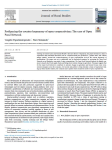
Article
Drawing on Ernesto Laclau and Chantal Mouffe's discourse theory of hegemony, the paper introduces a chain of equivalence that articulates discourses such as “commons-based peer production”, “partner state” and “ethical market entities” around th[...]









